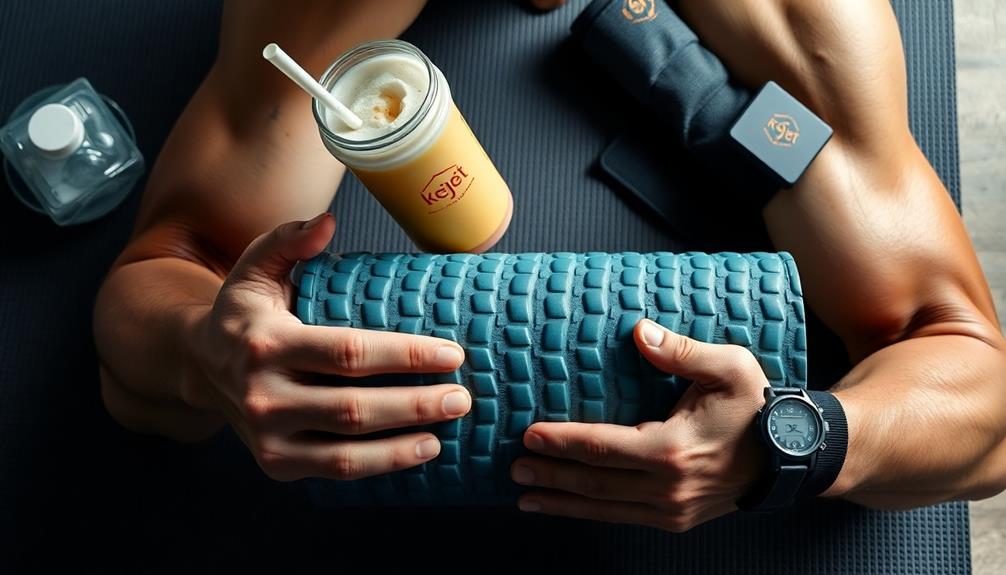To speed up muscle recovery, focus on these five essential tips: First, prioritize post-workout nutrition by consuming protein and carbs within 30 minutes after exercise. Second, hydrate strategically before, during, and after workouts to aid nutrient movement and muscle function. Third, implement active recovery techniques like light jogging or yoga to improve flexibility and blood flow. Fourth, optimize sleep quality by establishing a regular bedtime routine for 7-9 hours of rest. Finally, utilize compression gear to enhance blood flow and reduce muscle swelling. By incorporating these strategies into your routine, you'll be well on your way to faster recovery and better performance. Let's explore each tip in more detail.
Core Insight
- Prioritize post-workout nutrition with protein and carbs within 30 minutes to repair muscles and replenish energy.
- Stay hydrated before, during, and after workouts to aid nutrient movement and muscle function.
- Implement active recovery techniques like light activities, stretching, or foam rolling to improve blood flow and flexibility.
- Optimize sleep quality with a regular bedtime routine and aim for 7-9 hours of rest nightly.
- Utilize compression gear during and after intense activities to improve blood flow and reduce muscle swelling.
Prioritize Post-Workout Nutrition

The key to faster muscle recovery is what you eat after your workout. Your body needs the right nutrients to repair and rebuild muscle tissue. Eat a mix of protein and carbs within 30 minutes of finishing your exercise. Protein bars can be a quick and easy option for post-workout nutrition.
Protein is essential for fixing your muscles, so choose lean meats like chicken, fish, or plant-based proteins. Carbs refill your energy stores and fuel recovery. Go for complex carbs like whole grains or sweet potatoes.
Remember to stay hydrated. Water is crucial for moving nutrients and keeping your muscles working well. Drink lots of water before, during, and after your workout to help with recovery.
Try adding foods that fight inflammation to your post-workout meal, like berries or leafy greens. These can help reduce muscle soreness and speed up healing.
Hydrate Strategically

Drinking enough water is essential for your muscles to recover. Make sure to drink water before, during, and after your workouts. Aim for at least 8-10 glasses of water each day, and drink more on days when you exercise. Don't wait until you feel thirsty to drink water, as this means you're already a bit dehydrated. Consider adding coconut water to your routine for extra hydration, as it contains natural electrolytes and minerals that help your muscles recover.
While working out, take small sips of water often to replace the fluids you lose through sweat. After your workout, drink water or a beverage with electrolytes to rebalance your fluids and support muscle repair.
Keep in mind that everyone's hydration needs are different. If you do intense or long workouts, sports drinks with electrolytes and carbohydrates may be helpful. However, for most regular workouts, water is enough. Listen to your body and adjust how much you drink based on your needs.
Implement Active Recovery Techniques

Active recovery can speed up muscle recovery. Instead of resting completely, do low-intensity activities like light jogging, swimming, or biking. These keep your muscles moving without overdoing it. Stretching or yoga can also help improve flexibility and reduce tension.
Foam rolling breaks up knots in your muscles, improving blood flow and easing soreness. High-density foam rollers work well for a deep massage. Switching between hot and cold treatments boosts circulation and lowers inflammation. On rest days, try low-impact cross-training to stay fit while giving certain muscles a break.
Optimize Sleep Quality

Improving sleep quality is crucial for muscle recovery. Develop a regular bedtime routine and aim for 7-9 hours of sleep each night. Try natural sleep aids like lavender or chamomile to relax before bed. Keep your bedroom cool, dark, and quiet, and invest in a comfortable mattress and pillows.
Avoid screens for an hour before bed, as blue light can disrupt sleep. Read a book or practice relaxation techniques instead. Limit caffeine and alcohol, especially in the evening. If you can't fall asleep, get up and do a calming activity until you feel sleepy.
Utilize Compression Gear

Compression gear is a great tool for improving muscle recovery. These tight clothes squeeze specific parts of your body, which helps blood flow and reduces muscle swelling. You can find compression gear for different body parts, like sleeves for your arms or legs, socks, and even full-body suits. The amount of pressure can range from light (15-20 mmHg) to strong (30-40 mmHg), so you can pick what works best for you.
When you wear compression gear, you'll notice:
- Less muscle soreness
- Better blood flow
- Quicker recovery between workouts
- Better performance during exercise
To get the most out of compression gear, wear it while you work out and afterward. It's really helpful for intense activities or long training sessions. Make sure you choose the right size – if it's too loose, it won't give you enough pressure, but if it's too tight, it might cut off your blood flow. Add compression gear to your recovery plan, and you'll probably see a difference in how fast your muscles feel better.
Frequently Asked Questions
Can Massage Therapy Help With Muscle Recovery?
Yes, massage therapy can definitely help with muscle recovery. You'll find it reduces muscle tension, improves blood flow, and decreases inflammation. It's also great for easing soreness and promoting relaxation, which can speed up your overall recovery process.
How Do Age and Genetics Affect Muscle Recovery Time?
As you age, your muscle recovery slows down due to decreased hormone production and cellular repair. Your genetics also play a role, influencing factors like metabolism and inflammation response. You'll notice longer recovery times as these elements impact your body.
Are There Supplements That Can Enhance Muscle Recovery?
Yes, you can enhance muscle recovery with supplements. Consider using protein powders, BCAAs, creatine, and omega-3 fatty acids. Don't forget about vitamins like C and D. Always consult a healthcare professional before starting any new supplement regimen.
Does Muscle Soreness Always Indicate Effective Recovery?
No, muscle soreness doesn't always indicate effective recovery. While it can be a sign of muscle adaptation, excessive soreness may hinder your progress. You'll often experience the best results when you're only mildly sore or not sore at all.
How Does Stress Impact Muscle Recovery and Repair?
Stress negatively impacts your muscle recovery and repair. It increases cortisol levels, which can slow healing and protein synthesis. You'll experience prolonged soreness, reduced muscle growth, and decreased performance if you don't manage your stress effectively.

